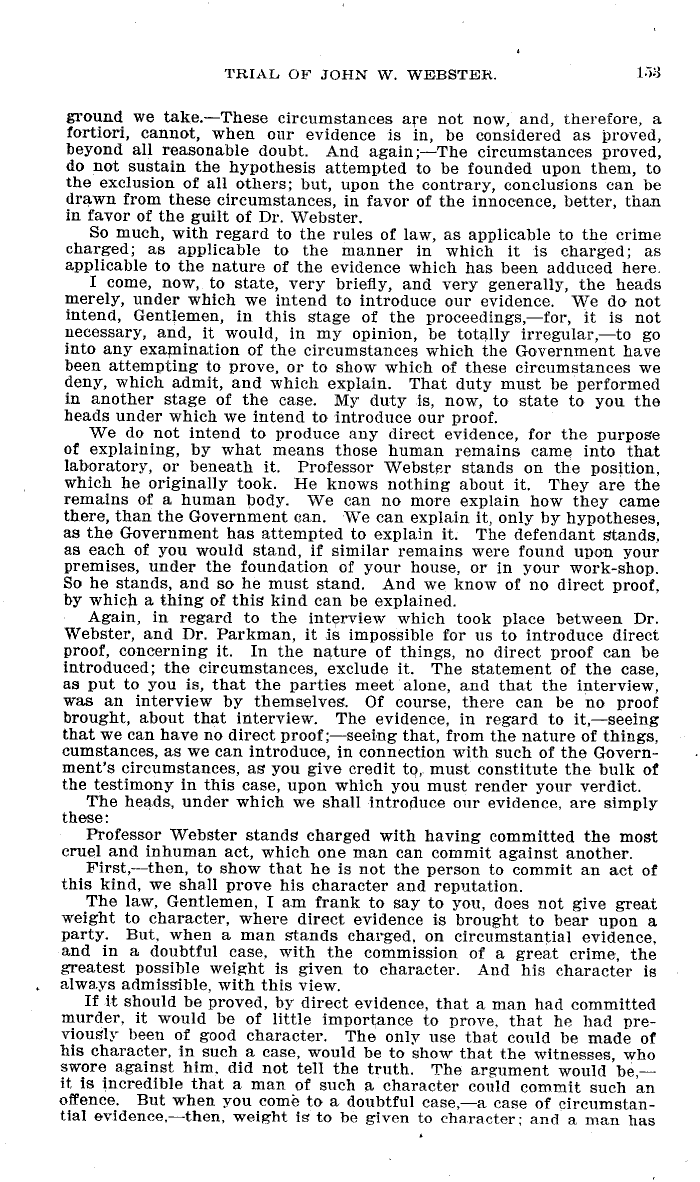|
TRIAL OF JOHN W. WEBSTER. 153
ground we take.-These circumstances ale not now, and, therefore, a
fortiori, cannot, when our evidence is in, be considered as proved,
beyond all reasonable doubt. And again; The circumstances prayed,
do not sustain the hypothesis attempted to be founded upon them, to
the exclusion of all others; but, upon the contrary, conclusions can be
drawn from these circumstances, in favor of the innocence, better, than
in favor of the guilt of Dr. Webster.
So much, with regard to the rules of law, as applicable to the crime
charged; as applicable to the manner in which it is charged; as
applicable to the nature of the evidence which has been adduced here.
I come, now, to state, very briefly, and very generally, the heads
merely, under which we intend to introduce our evidence. We do not
intend, Gentlemen, in this stage of the proceedings,-for, it is not
necessary, and, it would, in my opinion, be totally irregular,-to go
into any examination of the circumstances which the Government have
been attempting to prove, or to show which of these circumstances we
deny, which admit, and which explain. That duty must be performed
in another stage of the case. My duty is, now, to state to you the
heads under which we intend to introduce our proof.
We do not intend to produce any direct evidence, for the purpose
of explaining, by what means those human remains came into that
laboratory, or beneath it. Professor WebstPr stands on the position,
which he originally took. He knows nothing about it. They are the
remains of a human body. We can no more explain how they came
there, than the Government can. We can explain it, only by hypotheses,
as the Government has attempted to explain it. The defendant stands,
as each of you would stand, if similar remains were found upon your
premises, under the foundation of your house, or in your work-shop.
So he stands, and so he must stand. And we know of no direct proof,
by which a thing of this kind can be explained.
Again, in regard to the interview which took place between Dr.
Webster, and Dr. Parkman, it ,is impossible for us to introduce direct
proof, concerning it. In the nature of things, no direct proof can be
introduced; the circumstances, exclude it. The statement of the case,
as put to you is, that the parties meet alone, and that the interview,
was an interview by themselves. Of course, there can be no proof
brought, about that interview. The evidence, in regard to it,-seeing
that we can have no direct proof; seeing that, from the nature of things,
cumstances, as we can introduce, in connection with such of the Govern-
ments circumstances, as you give credit to,, must constitute the bulk of
the testimony in this case, upon which you must render your verdict.
The heads, under which we shall introduce our evidence, are simply
these:
Professor Webster stands charged with having committed the most
cruel and inhuman act, which one man can commit against another.
First,--then, to show that he is not the person to commit an act of
this kind, we shall prove his character and reputation.
The law, Gentlemen, I am frank to say to you, does not give great
weight to character, where direct evidence is brought to bear upon a
party. But, when a man stands charged, on circumstantial evidence,
and in a doubtful case, with the commission of a great crime, the
greatest possible weight is given to character. And his character is
always admissible, with this view.
If it should be proved, by direct evidence, that a man had committed
murder, it would be of little importance to prove, that he had pre-
viously been of good character. The only use that could be made of
his character, in such a case would be to show that the witnesses, who
swore against him, did not tell the truth. The argument would be,-
it is incredible that a man of such a character could commit such an
offence. But when you come to a doubtful case,-a case of circumstan-
tial evidence,-then, weight is to be given to character: and a man has
|

